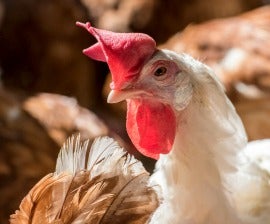PATNA — Humane Society International/India has joined with Bihar’s Department of Animal Husbandry, People for Animals and local organization Jag Jagran Sansthan to urge devotees of the Gadhimai festival in Nepal not to transport or sacrifice animals during the event this year in November, consistent with the order of the Hon’ble Supreme Court.
The quinquennial festival has long been considered the largest animal sacrifice festival in the world; hundreds of thousands of buffalo, goats, chickens and other animals are decapitated to placate Gadhimai, the goddess of power. Following campaigns by HSI/India and PFA at the last Gadhimai in 2014, there was an estimated 70 per cent reduction in animal sacrifice. In 2015 temple authorities declared a ban on future animal sacrifice. The public awareness drive seeks to ensure that news of the ban reaches the estimated 5 million devotees expected to attend the event.
In a joint effort spanning many months and multiple languages and dialects, the organisations are running street plays, radio advertisements, billboards, and utilising local celebrity support across key districts of Bihar via which the majority of devotees travel to Nepal for the Gadhimai festival.
Arkaprava Bhar, Humane Society International/India’s regional manager for East India, said: “The decision by the Gadhimai temple committee to end the animal sacrifice should spare the lives of hundreds of thousands of innocent animals. But for it to have impact we now have the huge task of making sure that the millions of people heading to Gadhimai are made aware of the temple’s ruling, and bring flowers, sweets and fruit to offer to the goddess instead of buffalo and birds. We are extremely grateful to the Government of Bihar for supporting our efforts to spread the news that the transport of animals to Nepal for religious sacrifice is illegal, and that the temple has also declared an end to this bloodshed. We hope that by watching our street theatre, listening to our radio ads, and reading our education materials, we can save as many animals as possible from a terrible and needles fate.”
The awareness drive started in early March and is now in its second phase in Muzaffarpur, bringing street plays to districts including Darbhanga, Madhubani, Supaul and Kishangan. Similar initiatives will be conducted in other districts of Bihar until October. The Government of Uttar Pradesh also joined with HSI/India and PFA earlier this year at the Kumbh Mela, the world’s largest religious congregation, to make attendees aware of the Gadhimal festival ban on animal sacrifice.
In 2014 the Sashastra Seema Bal, the border force at the Indo-Nepal border, was increased to intercept those attempting to bring live animals for sacrifice, and in total more than 2,000 animals were confiscated.
Mr. Vinod Gunjial, director of Bihar’s Animal Husbandry Department said: “With guards at the Indian-Nepalese border, the movement of animals can be controlled. The practise of sacrifice is not only brutal but also is very stressful to watch. We hope that with all these measures, the awareness drive should leave a positive impact on devotees of Gadhimai.”
Facts:
- The origins of Gadhimai are said to date back some 265 years when the founder of the Gadhimai temple, Bhagwan Chowdhary, had a dream that the goddess Gadhimai wanted blood in return for freeing him from prison, protecting him from evil, and promising prosperity and power. The goddess asked for a human sacrifice, but Chowdhary offered sacrifice of five animals instead, and this been repeated every five years since.
- It is estimated that more than 500,000 animals including buffalo, goats, chickens and others were decapitated at Gadhimai in 2009, but in 2014 the numbers had reduced by 70 percent.
- The Gadhimai temple committee’s 2015 ban on animal sacrifice at the temple was announced after rigorous negotiations with the Temple Trust members by Animal Welfare Network Nepal, PFA and HSI/India.
- While the temple’s ban on animal sacrifice is limited to the slaughter of buffalo within the main temple arena (as the only area that comes under its jurisdiction), it has appealed top devotees to refrain from all animal sacrifice that also takes place outside of the arena.
Download images from Awareness Drive and Gadhimai 2014 here.
Media Contact: Sanjana Rao, +91 8897827214, srao@hsi.org

